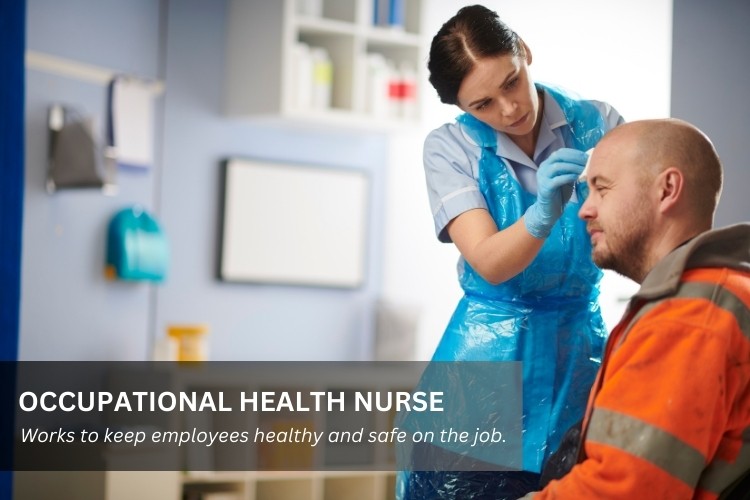Occupational Health Nurse
Healthcare Career Guide

Workplace safety and employee well-being are key to a healthy workforce, and Occupational Health Nurses specialize in keeping both a top priority. These nurses assess workplace hazards, manage on-the-job injuries, conduct health screenings, and promote wellness programs tailored to employee needs. They are often employed by corporations, government agencies, factories, and healthcare systems to bridge the gap between occupational safety and clinical care. Let's delve into the Occupational Health Nurse specialty and explore what it takes to thrive in this preventative, workplace-focused nursing role.
Overview
What Is an Occupational Health Nurse?
An Occupational Health Nurse (OHN) specializes in promoting and maintaining the health and safety of workers in various employment settings. These nurses evaluate workplace hazards, manage employee health programs, and respond to on-the-job injuries and illnesses.
Occupational Health Nurses work in manufacturing plants, corporate offices, construction sites, government agencies, and healthcare organizations. They provide wellness education, conduct health screenings, and support regulatory compliance with safety standards.
This career combines nursing expertise with knowledge of workplace safety, public health, and occupational regulations to reduce risks and improve workforce productivity.
Education
How Do I Become an Occupational Health Nurse?
Becoming an Occupational Health Nurse requires a combination of traditional nursing education, clinical experience, certification, and specialized training in workplace health and safety. Follow these steps to enter this challenging and rewarding healthcare career:
- Earn a Nursing Degree. Complete an Associate Degree in Nursing (ADN) or Bachelor of Science in Nursing (BSN). A BSN is preferred for advanced or leadership roles in occupational health.
- Pass the NCLEX-RN. Obtain your nursing license by passing the National Council Licensure Examination for Registered Nurses (NCLEX-RN).
- Gain Clinical Experience. Work as a Registered Nurse (RN) in public health, emergency care, or employee health clinics.
- Obtain Occupational Health Certification. Earn the Certified Occupational Health Nurse (COHN) or Certified Occupational Health Nurse–Specialist (COHN-S) credential through the American Board for Occupational Health Nurses (ABOHN).
- Continue Professional Development. Stay current with OSHA standards, environmental health policies, and workplace safety procedures through continuing education.
On average, it takes 4-6 years to become an Occupational Health Nurse, including education, licensure, and specialized certification. Professional credentials improve hiring potential and open doors to leadership roles in corporate health.

Average Salary
How Much Does an Occupational Health Nurse Make?
Salaries for Occupational Health Nurses vary depending on experience, industry, and employer size. On average, an Occupational Health Nurse can expect to earn between $80,000 and $110,000 annually.
Average annual salary for an Occupational Health Nurse:
- Entry-level: $80,000 - $90,000 per year.
- Mid-career: $90,000 - $100,000 per year.
- Experienced: $100,000 - $110,000 per year.
The U.S. Department of Labor includes Occupational Health Nurses under registered nursing roles, with an average hourly wage of approximately $42.00 per hour. Assuming a 40-hour workweek, this equates to an annual salary of $87,360. The lowest 10% earn less than $36.00 per hour, while the highest 10% earn more than $50.00 per hour, resulting in a salary range of $74,880 to $104,000 per year.
Job Duties
What Does an Occupational Health Nurse Do?
Occupational Health Nurses focus on the health and safety of employees in a workplace environment. They assess risks, treat workplace injuries, and promote wellness among staff.
The most common job duties of an Occupational Health Nurse:
- Conducting Workplace Assessments. Evaluate work environments for potential hazards and recommend safety improvements.
- Managing Employee Health Programs. Develop and lead initiatives such as wellness screenings, flu shot clinics, and smoking cessation programs.
- Responding to Injuries and Illnesses. Provide first aid, coordinate emergency care, and follow up on workers' compensation cases.
- Promoting Disease Prevention. Educate employees about hygiene, ergonomics, and health maintenance strategies.
- Supporting Return-to-Work Plans. Collaborate with human resources and medical providers to create accommodations for injured or ill workers.
- Ensuring Regulatory Compliance. Maintain OSHA records, manage medical surveillance programs, and support company compliance with health regulations.
- Providing Health Counseling. Offer one-on-one support for employees dealing with stress, chronic illness, or personal health challenges.
- Advanced Duties. Experienced Occupational Health Nurses may oversee safety teams, conduct epidemiological research, or work in global health risk management.
Occupational Health Nurses typically work in corporate offices, factories, government buildings, and on-site medical units. Their role is essential in reducing workplace injuries, improving health outcomes, and supporting a safe, productive work environment.

Essential Skills
What Skills Does an Occupational Health Nurse Need?
Occupational Health Nurses require a blend of clinical skills, regulatory knowledge, and communication abilities. These skills help them ensure employee safety and promote public health within the workplace.
Here are some of the skills an Occupational Health Nurse needs to succeed:
- Workplace Hazard Assessment. Identify physical, chemical, or ergonomic risks in the work environment.
- Emergency Response. Provide prompt care during accidents or medical emergencies on the job site.
- Regulatory Knowledge. Understand OSHA guidelines, ADA requirements, and health recordkeeping protocols.
- Health Promotion. Design and deliver programs that encourage wellness and prevent disease.
- Case Management. Track and coordinate care for injured employees and return-to-work transitions.
- Communication. Collaborate with employees, supervisors, HR personnel, and healthcare providers.
- Data Analysis. Review injury trends and health metrics to inform safety planning and prevention.
- Confidentiality and Ethics. Handle sensitive employee health information in compliance with privacy laws and professional standards.
One of the biggest challenges of being an Occupational Health Nurse is balancing regulatory duties with personalized care in fast-paced, diverse workplaces. However, the role is highly rewarding, as it allows nurses to improve employee well-being and reduce healthcare costs through proactive prevention.
Last updated: April 15, 2025
References:
- Registered Nurses. Bureau of Labor Statistics, U.S. Department of Labor. Occupational Outlook Handbook. Retrieved April 15, 2025.
- NCLEX Nurse Licensure Exam. National Council of State Boards of Nursing (NCSBN). Retrieved April 15, 2025.
- Occupational Health Nurse. Johnson & Johnson, Nursing Careers. Retrieved April 15, 2025.
- Occupational Health Nurse Salary in the United States. ZipRecruiter, Healthcare Career Path. Retrieved April 15, 2025.
- American Association of Occupational Health Nurses (AAOHN). Professional association of licensed nurses engaged in the practice of occupational and environmental health nursing. Retrieved April 15, 2025.
- Occupational Health Nurse Overview. Minnesota Medical Association, Career Guide. Retrieved April 15, 2025.
- Certified Occupational Health Nurse (COHN, COHN-S) Eligibility. American Board for Occupational Health Nurses, Certification. Retrieved April 15, 2025.
- Post-Bachelor's Certificate in Occupational Health Nursing. Weber State University, School of Nursing, College of Health Professions. Retrieved April 15, 2025.
- How To Become an Occupational Health Nurse in 5 Steps. Indeed, Healthcare Career Guide. Retrieved April 15, 2025.
- Occupational Safety and Health Administration (OSHA). OSHA sets and enforces workplace standards for the U.S. Department of Labor. Retrieved April 15, 2025.
- Occupational Health Nurse: How to Become and What to Expect from This Fulfilling Career Path. Nightingale College, Nursing Career Guide. Retrieved April 15, 2025.


